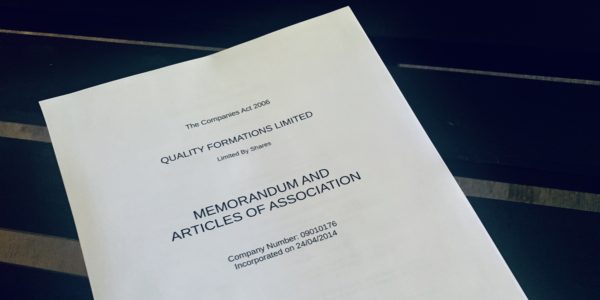Every limited company must have a register of members and ensure it is kept up-to-date at all times. In this blog, we will take a look at the basics of how the register of members works, what must be included, and when to update it.
What is a register of members?
As per section 113 of the Companies Act 2006, every limited company is obliged to keep a register of all its shareholders, also known as members, in a document called a register of members. This forms one of a set of different company registers which all need to be maintained.
The register of members is arguably the most important statutory register which companies limited by shares are required to keep. It contains information on past and present shareholders*, providing a continuous record of ownership since the company’s incorporation.
A person is not legally considered to be a company shareholder until their name is entered into the register of members. Although a share certificate is an important document to record share ownership, it is actually the register of members which serves as evidence of a member’s shareholdings.
* Guarantors, in a company limited by guarantee
What information needs to be kept in the register of members?
The following details must be stored and regularly updated in a company’s register of members:
- names and addresses of all the members
- the date on which each person was registered as a member
- the date at which any person ceased to be a member
In the case of a company having a share capital, there must be entered in the register, with the names and addresses of the members, a statement of:
- the shares held by each member, distinguishing each share –
- by its number (so long as the share has a number), and
- where the company has more than one class of issued shares, by its class, and
- the amount paid or agreed to be considered as paid on the shares of each member.
Other details which must be recorded in this document include:
- If the company has converted any of its shares into stock, and given notice of the conversion to Companies House, the amount and class of stock held by each member instead of the amount of shares and the particulars relating to shares.
- In the case of joint holders of shares or stock in a company, the company’s register of members must state the names of each joint holder. However, only the address of one of these joint holders needs to be recorded.
- In the case of a company that does not have a share capital but has more than one class of members, with the names and addresses of the members, a statement of the class to which each member belongs.
- Details of any transfer of shares.
- Details of allotments of new shares.
- Details of any shares held in treasury.
Any changes to the information set out above must be reflected in the register of members.
How should the register of members be maintained?
The register of members takes the form of a written or electronic document. Under section 1135 of the Companies Act 2006, statutory registers “may be kept in hard copy or electronic form [capable of being reproduced in hard copy form]”.
Traditionally, the register of members had to be available for inspection at the company’s registered office, or a single alternative inspection location (SAIL). But since June 2016, private companies have been allowed to choose to send information usually kept in their own certain statutory registers, to the registrar of companies, to be kept on the public register at Companies House.
Who can inspect the register of members?
Under section 116 of the Companies Act 2006, any person may ask a company to inspect its register of members, as well as ask for a copy. This not only includes other members of the company but also the general public.
Members should be allowed to see the register of members without any fee. But the company is allowed to charge non-members an administration fee.
Anyone who requests to inspect the register of members must provide the following information as part of their request:
- in the case of an individual, their name and address
- in the case of an organisation, the name, and address of an individual responsible for making the request on behalf of the organisation, such as a company director
- the purpose for which the information being requested is to be used
- whether the information will be disclosed to any other person, and if so:
- where that person is an individual, his name and address,
- where that person is an organisation, the name and address of an individual responsible for receiving the information on its behalf, and
- the purpose for which the information is to be used by that person.
Within five working days of receiving a request under section 116, the company must either comply or, if it believes the request is not made for a ‘proper purpose’, apply to a court to refuse the request.
Note: The register of members is sometimes used by auditors or as part of a due diligence process, to confirm details of the shareholders, or as part of a wider investigation.
When is it necessary to update the register of members?
It is good practice to regularly update the register of members. In particular, it should be amended when:
- A shareholder officially changes their name by marriage or deed poll. Evidence of the name change should be obtained before amending a name.
- A shareholder changes their primary address.
- New shares are issued to either new or existing members.
- Shares are transferred to a new shareholder, e.g. if they are sold or inherited.
- There is a reorganisation of company shares, e.g. consolidation or subdivision, etc.
It should be updated as soon as possible after the company directors are made aware of the relevant changes.
Do I need to inform Companies House when I update the register of members?
For companies that maintain their own register of members, there is no requirement to immediately update company information held by Companies House. But if there is a change to the register of members, this should be reflected in the annual confirmation statement.
If the register of members is being maintained by Companies House, then this needs to be updated as soon as possible.
What happens if the register of members is not maintained?
Failure to maintain the register of members will result in an offence having been committed by the company and each officer (i.e. directors and the company secretary).
Breach of the requirement to maintain statutory registers can result in fines of up to £5,000. Additionally, there is a risk of the officers being found to have breached their duties, and further penalties being imposed.
Please note that the information provided in this article is for general informational purposes only and does not constitute legal, tax, or professional advice. While our aim is that the content is accurate and up to date, it should not be relied upon as a substitute for tailored advice from qualified professionals. We strongly recommend that you seek independent legal and tax advice specific to your circumstances before acting on any information contained in this article. We accept no responsibility or liability for any loss or damage that may result from your reliance on the information provided in this article. Use of the information contained in this article is entirely at your own risk.







Join The Discussion
Comments (22)
I appreciate the regular updates and fresh content on this website. It keeps me coming back for more.
Thanks for your kind words, Twila.
Kind regards,
The QCF Team
bookmarked!!, I love your website!
We’re glad you like our articles, Mary.
Kind regards,
The QCF Team
Do you mind if I quote a few of your posts as long as I provide credit
and sources back to your webpage? My blog site is in the very same
area of interest as yours and my users would truly benefit from some
of the information you provide here. Please let me know if this ok with you.
Regards!
Hi Tammie – this is fine, no problem.
Kind regards,
The QCF Team
Thanks for finally writing about > Register of Members Explained
We’re glad you found this article useful, Nila.
Kind regards,
The QCF Team
Hi there,
If a register of members needs to be amended ( the number of shares held by a certain member) would it be recommended that a deed of rectification is put in place to rectify the register to indemnify the company against any liability ( we as company secretaries are a seperate company to the company who holds the register of members) ? ( it is not thought to be substantial enough to get a court order to amend)
Thanks in advance
Thanks for the question!
Please note that we are unable to comment on legal matters.
In the first instance, it is important to clarify that rectifications should be taken on a case-by-case basis. It would first need to be ascertained the nature of the error.
Sometimes, if the error is clerical, the register can be corrected informally. If the error is not clerical, and instead is more substantive, then the company would normally need to apply to the court for a rectification.
In any case, we have seen in the past the shareholders of the company attempt to release the directors of liability for the errors by passing a resolution, however, we would not be able to comment on this ourselves.
If there is any doubt, it may be preferable to make an application to the court to rectify the register.
I am sorry we could not be of more assistance.
Kind regards,
The QCF Team
If a company is listed publicly (and principally) on the LSE- but is incorporated in the Virgin Islands- are they exempt from this duty (as one company has claimed). The rules in the Virgin Islands Companies Act- are a bit different- there is not a specific time frame for the company to respond, and members of the public dont have a statutory right to inspect the register (even with a fee).
Thanks for the question.
Generally speaking, a company that is not registered in the UK would not be subject to the stipulations laid out in the Companies Act 2006.
However, the listing of a company on an exchange, like the London Stock Exchange, would mean they are subject to the rules of that exchange.
We hope that helps.
Regards,
The QCF Team
If I wanted to inspect the register of members for the company I am a member off with the purpose of contacting fellow members seeking to propose removal of the current directors, would I be allowed to write down all the names/addresses while inspecting (free) or do I need to request a copy of the register and pay the prescribed fee? thanks
Thanks for the comment.
The general rule is, as you have mentioned, no fee may be stipulated for members to access the statutory registers.
Section 116 of the Companies Act 2006 permits the company to charge a fee for a copy of the said register(s) if they so wish.
We aren’t aware of any rules in the Companies Act 2006 which prevent a person from copying the information they have obtained through an inspection on a reasonable basis.
We hope that helps!
Regards,
The QCF Team
Thanks for the reply. Thats really helpful.
If the company were to deem my request ‘not proper’ and the court agreed, would I be liable for £1,000s in costs or is it not a high court they’d apply to get the ‘no-access’? im weighing up wether its worth the risk if I could be tens of tounds of £s in the red if my purpose is deemed improper (such a subjective term)! If were talkin a few hundred pounds then its deff worth it.
many thanks
No problem at all!
Unfortunately, because we’re now getting into specifics, we can’t advise any on this any further – sorry!
We wish you the best of luck in getting this sorted out.
Regards,
The QCF Team
How would you go about reporting a very suspect company who has breached the 5 day deadline on a request to inspect the register of members?
Thank you for your kind enquiry, Beppe.
The Companies Act 2006 requires that the register of members must be open to inspection by any member of the company as well as any other person. Members of the company who wish to inspect the register must not be charged for the right to do so. As you have pointed out, companies have five working days from the point they receive the request to allow for the inspection to take place, or alternatively refer the matter to the courts. They can’t simply ignore the request, even if they think the request is not proper. Failure to respond to a request will leave every officer liable to a fine (with a further daily default fine for continued failure to adhere).
In such instances where the provisions of the Companies Act have not been complied with, the Insolvency Service Criminal Enforcement Team would prosecute such an offence, and we would suggest you speak to a solicitor in terms of your specific case.
We trust this information is of use to you.
Regards,
The QCF Team
I first contacted Companies House on 3/10/2022 to complain that my private comany limited by shares is refusing to give me a copy of the Register of Members that I had requested several weeks previously.
I have emails in reply to this eamil and my later ones, among them one that advises me that my company has not challenged my request in court. And I have notifiefd Cmopanies House, twice, the last time on 11/11/2022, that I still have not received the Register of Members that I seek.
What on earth can be causing this hold-up? And what can I do about it?
Thank you for your kind enquiry, Sophie.
Any person can submit a request for a company’s registered of members if it is for a “proper purpose” which needs to be fulfilled within 5 days. The company should either then provide a copy in line with the request or, if the company believes that the request is not “proper”, they should apply to the court to permit them not to make the disclosure. Based on your comment, it appears neither of this has happened. We would therefore suggest you may want to take legal advice as to what the next steps you could take are.
We trust this information is of use to you.
Kind regards,
The QCF Team
Dear QCF Team,
Thank you for yor reply. Should I infer from what you said that Companies House cannot enforce compliance with s116 of the Companies Act 2006?
Thank you for your follow up question, Sophie.
In general terms, Companies House only have enforcement capability for certain deficiencies in adhering to the Companies Act 2006. In the instance of section 116, it is very likely that enforcement would have to be sought via a Court Order.
We trust this information is of use to you.
Kind regards,
The QCF Team